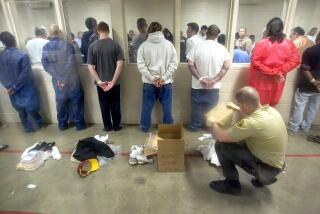Special Request Awaits Judge in Keating Case : Courts: Prosecutors want the convicted ex-thrift operator to finish his state sentence before he goes to a federal penitentiary.
- Share via
The federal judge sentencing former Lincoln Savings & Loan operator Charles H. Keating Jr. today will have an unusual request from state prosecutors: They want Keating to finish his state sentence in a California prison before he goes to a federal penitentiary.
Keating, convicted of state securities fraud in 1991 and sentenced to 10 years in prison, will face considerably more prison time today for his federal court convictions last January on 73 counts of racketeering, conspiracy and fraud.
Federal prosecutors are asking U.S. District Judge Mariana R. Pfaelzer to sentence Keating to 25 to 30 years in prison. In cases in which a defendant is convicted in state and federal courts for related crimes, the state typically turns the defendant over to the federal system.
But state prosecutors want Keating to serve the time owed in the less hospitable California Men’s Colony in San Luis Obispo for “practical and symbolic value,” said Deputy Los Angeles County Dist. Atty. William Hodgman, the chief prosecutor in the state case.
“If our state laws are to have validity and meaning, it is vitally important that he serve his time in a state prison,” Hodgman said. “And it’s important to the victims that we give California prison time for California convictions.”
Keating has already served 15 months and--with time off for good behavior--would serve only 45 months more in state prison.
Both convictions stem from the 1989 collapse of the Irvine thrift and its parent company, American Continental Corp. in Phoenix. Lincoln’s failure is one of the nation’s costliest, leaving taxpayers with a $2.6-billion cleanup bill. The parent company’s bankruptcy left small investors, mostly elderly Southern Californians, with more than $250 million in losses.
Keating--generally known as Charlie--was sent to Quadrangle C of the California Men’s Colony to serve his 10-year state sentence. Ironically, Quadrangle C is also known as Charlie Quad.
He has been in federal custody, though, since Pfaelzer opened his second criminal trial last October, most recently in a modern federal prison in Arizona, his home state. He wants to remain there.
If the judge returns him to the state, he will go back instead to the Men’s Colony East Facility. The 32-year-old prison, which holds 3,500 inmates in cells designed for 2,400, is a mass of mustard-yellow ugliness made grimmer by spectacular, taunting Bishops Peak and other crags looming beyond.
Charlie Quad is notable for housing many prisoners whose psychological problems are controlled by medication, and for its inmate gardens, which are far more carefully tended than those in quads A, B and D.
The two are connected, according to Dan Jester, a murderer serving 25 years to life. Jester, remarking that his own mental problems have been soothed by prescribed drugs, said inmates on mood-control medication “spend a lot of time on those gardens, and they always look good.”
He sat near a 100-foot mural, painted by an inmate, depicting a pastoral coastal scene. Marigolds, canna lilies and calla lilies were planted in front of the wall; prisoners stand there for photographs that appear to show them free, with sailboats, sea gulls and hang gliders in the background.
“The atmosphere helps here,” Jester said. “There’s less trouble on this quad.”
Yet if the gardens are bright, the inside, as prisons go, is grim. Cells designed for one prisoner have just 39 square feet of walkable floor space, enough for three or four steps before turning around. When a second person is housed in them, as overcrowding obliges, inmates must crawl off the end of their beds to use the toilet.
Prison officials said Keating regularly attended Mass in the Roman Catholic chapel at the prison. One of his jobs was carrying forks and spoons to and from tables in the canteen.
“As an employee he was very responsible--in general a very good worker,” said Correctional Officer David Grapentine, who supervised those duties.
Keating maintains he was prosecuted twice for the same reason--the thousands of Lincoln depositors who lost money buying bonds issued by American Continental.
Keating’s lawyer, Stephen C. Neal, said there is no reason why his 69-year-old client should not serve his sentences concurrently in Arizona.
“With all the financial problems the state of California is having, why do they care whether he’s in state or federal custody?” the attorney said.
But Hodgman, the state prosecutor, said that the California conviction came first, and the sentence should be served first--at a state prison.
“It’s important,” Hodgman said. “California will be glad to foot the bill on this one.”
More to Read
Sign up for Essential California
The most important California stories and recommendations in your inbox every morning.
You may occasionally receive promotional content from the Los Angeles Times.










